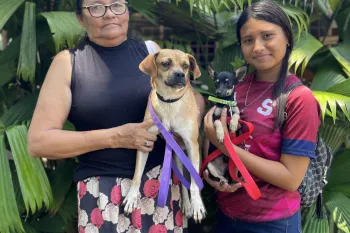TORTUGUERO—Despite being diagnosed with heartworm disease, a cheerful dog named Pulgosin is showing steady improvement thanks to the treatment he received during free animal clinics organized in the Limón Province by Humane World for Animals Costa Rica, formerly called Humane Society International Latin America.
Pulgosin was one of 98 pets—including 80 dogs, 17 cats, and one guinea pig—treated during the May clinic in Tortuguero. The clinic was the third held in the region as part of the Animal-Friendly Communities pilot project, a community-driven initiative led by Humane World for Animals Costa Rica to improve the health and well-being of local companion animals while promoting responsible pet ownership and human-wildlife coexistence.
During the clinic, veterinary professionals provided a range of services at no cost to residents including general consultations, diagnostic testing, vaccinations, deworming and microchipping. Pet owners also received educational materials on responsible pet keeping, disease prevention, and coexistence with wildlife, all grounded in the One Health approach, which recognizes the interconnectedness of human, animal and environmental health.
“These health campaigns are especially important given that access to veterinary care in Tortuguero is limited,” said Sofia Herra, manager of the Cruelty and Companion Animals program at Humane World for Animals Costa Rica. “Not only do these initiatives improve the lives of animals, but they also protect the area’s biodiversity by promoting responsible pet ownership and reducing negative interactions between pets and wildlife.”
Pulgosin was diagnosed with Dirofilaria immitis, a heartworm parasite commonly found in the Caribbean. With ongoing treatment and dedicated care from his owner, Esther Hogson, Pulgosin’s weight and mood have substantially improved. “He's done well with the treatment and has even gained weight,” said Hogson. “We've received very good and prompt care here. For those of us who live in such a remote community, these health campaigns represent a great benefit for our companion animals.”
“Pulgosin’s story is a great example of the great effect this initiative can have,” said Herra. “By providing detection and treatment of diseases in companion animals, these clinics can have a positive impact on pets, wildlife and the community itself.”
The pilot project in Tortuguero is being developed within the framework of the inter-institutional program Costa Rica Silvestre (a human-wildlife coexistence initiative). The work entails close collaboration with the Ministry of Environment and Energy, through its National Commission for Biodiversity Management and the National System of Conservation Areas, the National Animal Health Service (SENASA), the School of Veterinary Medicine and the Hospital for Minor and Wild Species of the National University, ASVO Costa Rica, Panthera Costa Rica, Sea Turtle Conservancy, the Tortuguero Environmental Committee and the Tortuguero Development Association, as well as the participation of a dedicated group of local “animal ambassadors” who are instrumental in running these clinics.
